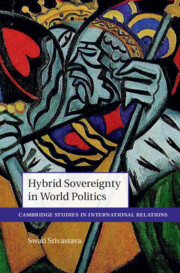Book contents
- Hybrid Sovereignty in World Politics
- Cambridge Studies in International Relations: 161
- Hybrid Sovereignty in World Politics
- Copyright page
- Dedication
- Contents
- Figures
- Tables
- Acknowledgments
- Introduction
- 1 Hybrid Sovereignty in International Theory
- 2 Ideal-Types of Public/Private Hybridity
- 3 Hybrid Sovereign Empire in the English East India Company
- 4 Contracting American Wars through Blackwater
- 5 Institutionalizing Markets through the International Chamber of Commerce
- 6 Shadowing for Human Rights through Amnesty International
- 7 Conclusions on Power and Responsibility in Hybrid Sovereignty
- References
- Index
- Cambridge Studies in International Relations
1 - Hybrid Sovereignty in International Theory
Published online by Cambridge University Press: 01 September 2022
- Hybrid Sovereignty in World Politics
- Cambridge Studies in International Relations: 161
- Hybrid Sovereignty in World Politics
- Copyright page
- Dedication
- Contents
- Figures
- Tables
- Acknowledgments
- Introduction
- 1 Hybrid Sovereignty in International Theory
- 2 Ideal-Types of Public/Private Hybridity
- 3 Hybrid Sovereign Empire in the English East India Company
- 4 Contracting American Wars through Blackwater
- 5 Institutionalizing Markets through the International Chamber of Commerce
- 6 Shadowing for Human Rights through Amnesty International
- 7 Conclusions on Power and Responsibility in Hybrid Sovereignty
- References
- Index
- Cambridge Studies in International Relations
Summary
This chapter theorizes that sovereignty is the interplay of two contrasting modalities. In Idealized Sovereignty, sovereign authority is represented exclusively in “the state” per the doctrine of indivisibility developed by early modern theorists and reified in IR theory. In Lived Sovereignty, achieving sovereign competence involves divisible practices of state and nonstate actors in a variety of social relations. We would do a disservice to sovereignty’s complexity if only one of the two modes persevered in analyses of sovereignty. Instead, the chapter intervenes in major IR debates to argue that sovereignty should be hybridized. This overarching framework guides the ideal-types of public/private hybridity developed in the next chapter and the empirical analyses in the remainder of this book, where hybrid sovereignty is necessary to build a global empire, go to war, regulate global markets, and protect rights.
Keywords
- Type
- Chapter
- Information
- Hybrid Sovereignty in World Politics , pp. 12 - 39Publisher: Cambridge University PressPrint publication year: 2022

